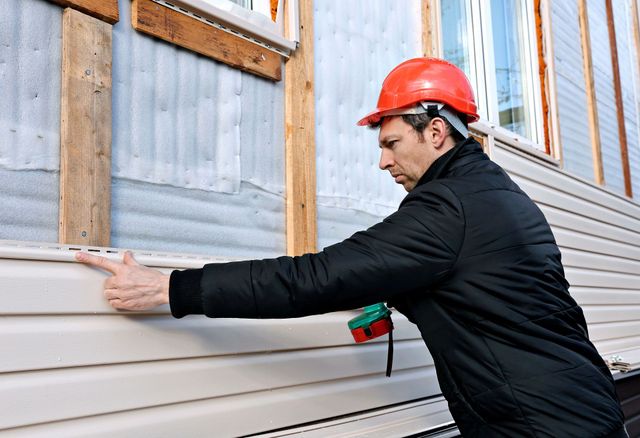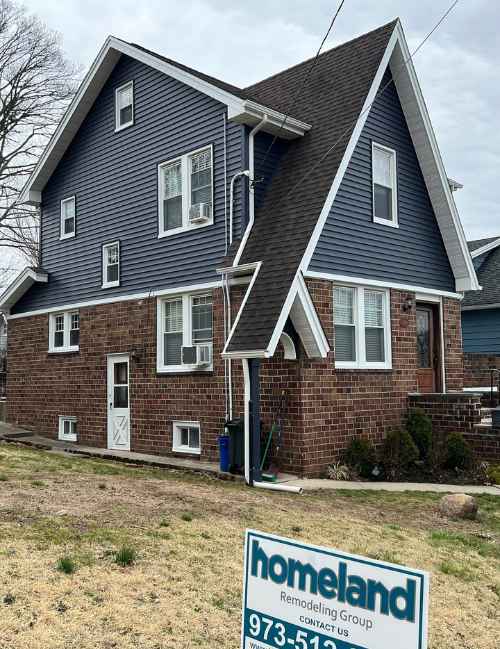Skilled Morris Siding Contractor Providing Customized Exterior Solutions
Skilled Morris Siding Contractor Providing Customized Exterior Solutions
Blog Article
The Necessary Guide to the Different Kinds Of Exterior Siding and Their One-of-a-kind Benefits
In the world of home improvement, choosing the appropriate siding is a critical decision that affects both visual allure and functional efficiency. The selection of materials offered, such as timber, vinyl, fiber concrete, metal, and block, each offer special advantages that satisfy various needs and choices. Understanding these distinctions can significantly improve the longevity and value of a residential or commercial property - morris siding contractor. Nevertheless, with a lot of options to take into consideration, which siding material really sticks out for your details task? Exploring these choices can result in notified decisions that align with both style and practicality.
Wood Siding
Timber home siding, a prominent option for residential outsides, provides an ageless aesthetic that combines all-natural appeal with structural integrity. This house siding product is offered in various designs, including clapboard, shingles, and board-and-batten, permitting property owners to customize their appearance to match their style preferences. Timber exterior siding is generally crafted from sturdy types such as cedar, redwood, or yearn, which are recognized for their durability and ability to stand up to environmental stress factors.
One of the key benefits of timber home siding is its excellent insulation residential or commercial properties, which can add to energy performance and lower home heating expenses. In addition, wood house siding is naturally degradable, making it an eco-friendly option when sourced sustainably. Routine upkeep, including paint or staining, can lengthen its life expectancy and enhance its look, allowing house owners to protect the all-natural appeal of the timber.
Nevertheless, possible downsides include vulnerability to parasites, rot, and weather damage, requiring ample treatment and maintenance - morris siding contractor. In spite of these problems, when properly taken care of, timber house siding can provide a durable and stunning option that boosts the personality of a home while offering a warm, inviting environment

Vinyl House Siding
Vinyl siding has actually become a leading selection for house owners looking for a low-maintenance outside alternative that integrates durability and affordability. This functional product is crafted from polyvinyl chloride (PVC), making it immune to numerous weather problems, including dampness and UV rays. As a result, plastic siding does not warp, rot, or discolor, ensuring resilient visual appeal.
Among the primary benefits of plastic siding is its substantial variety of styles and colors, enabling homeowners to accomplish the wanted try to find their building without the need for regular repainting. Additionally, vinyl house siding is very easy to install, which can substantially lower labor costs during building or improvement projects.
Vinyl home siding additionally adds to energy efficiency. Numerous choices function insulation support, which boosts thermal efficiency, aiding to maintain comfortable indoor temperatures and potentially reducing energy expenses. In addition, its smooth surface area facilitates easy cleaning, requiring only regular cleaning with a yard tube to remove dirt and debris.
Fiber Cement Siding
Fiber concrete house siding has actually gotten traction among contractors and property owners alike due to its remarkable mix of durability and visual adaptability. Composed of a mix of cellulose, concrete, and sand fibers, this exterior siding option is crafted to endure extreme weather, including high winds, heavy rainfall, and temperature level changes, making it a resilient choice for household exteriors.

One of the main benefits of fiber cement siding is its resistance to bugs, such as termites, and its non-combustible nature, offering enhanced fire safety and security. morris siding contractor. Additionally, it is offered in a continue reading this wide variety of shades, structures, and designs, enabling homeowners to accomplish their desired aesthetic without compromising efficiency
Another advantage is its reduced maintenance demands; fiber cement exterior siding generally needs paint or staining every 5-10 years, which is much less frequent than other products. Moreover, its longevity adds to a lower total expense of possession, as it decreases the requirement for frequent repair work or replacements.
Inevitably, fiber concrete exterior siding represents an excellent investment for those looking for a resistant, attractive, and functional exterior option, integrating both form and feature to improve the home's aesthetic appeal.
Metal House Siding
The allure of metal exterior siding exists in its durable resilience and contemporary visual allure, making it a popular choice for modern design. Available in materials such as aluminum and steel, steel house siding supplies a variety of shades and surfaces, permitting property owners to attain a tailored look that matches their design vision.

Power performance is another significant advantage, as many steel siding products are designed with insulation options that help manage interior temperature levels. This can bring about lowered power expenses gradually. Furthermore, metal exterior siding is usually recyclable, making it an eco pleasant option for sustainability-minded house owners.
The setup procedure for metal exterior siding can be fairly straightforward, resulting in a quicker turnaround time for building projects. In general, metal siding integrates performance and style, making it a functional alternative for those looking for a long-lasting and aesthetically attractive outside coating.
Brick and Stone House Siding
Block and stone siding stands out as a classic option that improves the aesthetic beauty of any type of home. Known for their resilience and reduced upkeep, these materials give an extraordinary return on investment while boosting the property's aesthetic charm. Available in numerous colors, appearances, and patterns, brick and stone can be customized to fit diverse building styles, from traditional to modern-day.
One of the key advantages of brick and rock siding is their power efficiency. Both materials have natural insulating residential or commercial properties that aid manage interior temperatures, possibly decreasing cooling and heating prices. Additionally, they provide premium fire resistance contrasted to various other siding choices, contributing to boosted safety and security.
Another benefit click here for more info is their longevity. Brick and stone can last for decades, usually calling for minimal upkeep beyond occasional cleaning. Unlike wood exterior siding, they are invulnerable to bugs and rot, making certain a durable exterior that withstands the elements.
Final Thought
In recap, the choice of exterior siding considerably influences a home's aesthetic allure, energy performance, and upkeep requirements. Each kind of home siding-- whether wood, plastic, fiber brick, metal, or concrete and stone-- offers special benefits customized to numerous homeowner choices and ecological problems.
One of the main benefits of wood home siding is its why not find out more excellent insulation properties, which can add to power efficiency and lower heating costs. Furthermore, timber exterior siding is eco-friendly, making it an environmentally pleasant alternative when sourced sustainably.One of the primary advantages of steel siding is its resistance to different ecological factors.Energy effectiveness is an additional considerable benefit, as several metal exterior siding products are made with insulation alternatives that help control indoor temperature levels. Each kind of house siding-- whether wood, vinyl, fiber steel, concrete, or block and rock-- supplies unique benefits tailored to different house owner choices and ecological problems.
Report this page